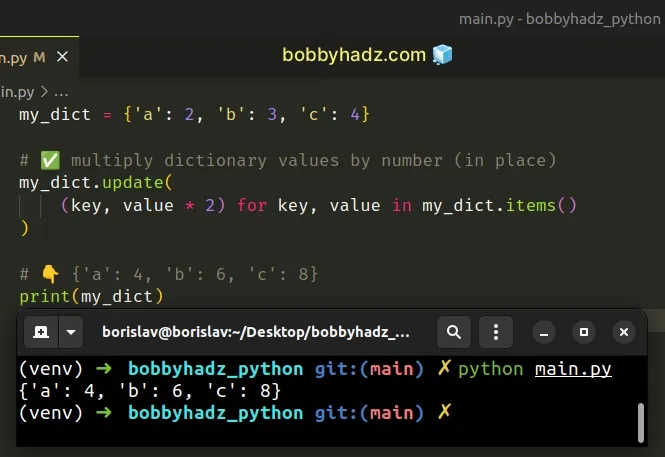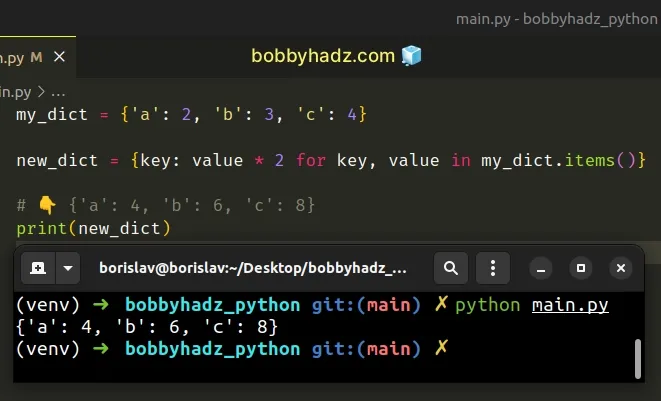Multiply the Values in a Dictionary in Python
Last updated: Apr 9, 2024
Reading time·5 min

# Table of Contents
- Multiply dictionary values by a constant in Python
- Multiply all of the values in a Dictionary
- Multiply two Dictionaries in Python
# Multiply dictionary values by a constant in Python
To multiply the values in a dictionary by a constant:
- Use the
dict.items()method to get a view of the dictionary's items. - Use a generator expression to iterate over the view and return tuples of key-value pairs.
- Pass the result to the
dict.update()method.
import math my_dict = {'a': 2, 'b': 3, 'c': 4} # ✅ multiply dictionary values by number (in place) my_dict.update( (key, value * 2) for key, value in my_dict.items() ) # 👇️ {'a': 4, 'b': 6, 'c': 8} print(my_dict)

The example multiplies the values of the dictionary by a constant, in place.
The dict.items() method returns a new view of the dictionary's items ((key, value) pairs).
my_dict = {'a': 2, 'b': 3, 'c': 4} # 👇️ dict_items([('a', 2), ('b', 3), ('c', 4)]) print(my_dict.items())
We used a generator expression to iterate over the view of items.
On each iteration, we return a tuple containing 2 elements - a key and a value.
my_dict = {'a': 2, 'b': 3, 'c': 4} my_dict.update((key, value * 2) for key, value in my_dict.items()) # 👇️ {'a': 4, 'b': 6, 'c': 8} print(my_dict)
The dict.update method updates the dictionary with the key/value pairs from the provided value.
The method overrides the dictionary's existing keys and returns None.
dict.update() method can either be called with another dictionary or an iterable of key/value pairs (e.g. a list of tuples with 2 elements each).# Multiply dictionary values by a constant using a dict comprehension
Alternatively, you can use a dict comprehension to get a new dictionary with the results of the multiplication.
my_dict = {'a': 2, 'b': 3, 'c': 4} new_dict = {key: value * 2 for key, value in my_dict.items()} # 👇️ {'a': 4, 'b': 6, 'c': 8} print(new_dict)

Dict comprehensions are very similar to list comprehensions.
On each iteration, we multiply the current value by 2 and return the key-value
pair.
The new dictionary contains the multiplication results and the original dictionary remains unchanged.
# Multiply dictionary values by a constant using a for loop
You can also use a for loop to multiply a dictionary's values by a constant.
my_dict = {'a': 2, 'b': 3, 'c': 4} for key in my_dict: my_dict[key] *= 2 print(my_dict) # 👉️ {'a': 4, 'b': 6, 'c': 8}
On each iteration, we set the current key to the result of multiplying its value
by 2.
# Multiply all of the values in a Dictionary
If you need to multiply all of the values in a dictionary, use the math.prod()
method.
import math my_dict = {'a': 2, 'b': 3, 'c': 4} # 👇️ 24 (same as 2 * 3 * 4) print(math.prod(dict.values(my_dict)))
The dict.values method returns a new view of the dictionary's values.
my_dict = {'a': 2, 'b': 3, 'c': 4} print(my_dict.values()) # 👉️ dict_values([2, 3, 4])
The math.prod() method calculates the product of all the elements in the provided iterable.
import math my_tuple = (5, 5, 5) result = math.prod(my_tuple) print(result) # 👉️ 125
The method takes the following 2 arguments:
| Name | Description |
|---|---|
| iterable | An iterable whose elements to calculate the product of |
| start | The start value for the product (defaults to 1) |
If the iterable is empty, the start value is returned.
# Multiply all of the values in a Dictionary using a for loop
You can also use a for loop to multiply all of the values in a dictionary.
my_dict = {'a': 2, 'b': 3, 'c': 4} result = 1 for value in my_dict.values(): result = result * value print(result) # 👉️ 24
The code sample uses a for loop to iterate over the dictionary's values.
On each iteration, we multiply the current value by the result variable and
update its value.
# Multiply two Dictionaries in Python
If you need to multiply two dictionaries, use a dict comprehension.
dict_1 = { 'a': 2, 'b': 3, 'c': 4, } dict_2 = { 'a': 3, 'b': 4, 'c': 5 } result = {key: dict_1[key] * dict_2[key] for key in dict_1} # 👇️ {'a': 6, 'b': 12, 'c': 20} print(result) print(sum(result.values())) # 👉️ 38
We used a dict comprehension to iterate over one of the dictionaries.
Dict comprehensions are very similar to list comprehensions.
On each iteration, we access the same key from the two dictionaries and multiply the values.
# Multiply two dictionaries using dict.items()
Alternatively, you can use the dict.items() method to get a view of the
dictionary's items.
dict_1 = { 'a': 2, 'b': 3, 'c': 4, } dict_2 = { 'a': 3, 'b': 4, 'c': 5 } # 👇️ dict_items([('a', 2), ('b', 3), ('c', 4)]) print(dict_1.items()) result = {key: num * dict_2[key] for key, num in dict_1.items()} # 👇️ {'a': 6, 'b': 12, 'c': 20} print(result)
The dict.items method returns a new view of the dictionary's items ((key, value) pairs).
# Getting the sum of the values in the new Dictionary
If you need to get the sum of the values in the new dictionary, pass the result
of calling dict.values() to the sum() function.
dict_1 = { 'a': 2, 'b': 3, 'c': 4, } dict_2 = { 'a': 3, 'b': 4, 'c': 5 } # 👇️ dict_items([('a', 2), ('b', 3), ('c', 4)]) print(dict_1.items()) result = {key: num * dict_2[key] for key, num in dict_1.items()} # 👇️ {'a': 6, 'b': 12, 'c': 20} print(result) print(result.values()) # 👉️ dict_values([6, 12, 20]) print(sum(result.values())) # 👉️ 38
The dict.values() method returns a new view of the dictionary's values.
The sum() function takes an iterable, sums its items from left to right and returns the total.
# Additional Resources
You can learn more about the related topics by checking out the following tutorials:
- How to set all Dictionary values to 0 in Python
- Sum all values in a Dictionary or List of Dicts in Python
- Swap the keys and values in a Dictionary in Python
- Check if all values in a Dictionary are equal in Python
- How to Replace values in a Dictionary in Python
- Get multiple values from a Dictionary in Python
- Join the Keys or Values of Dictionary into String in Python

